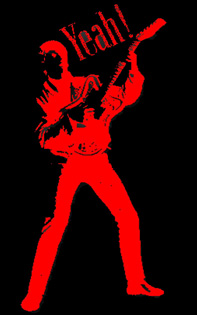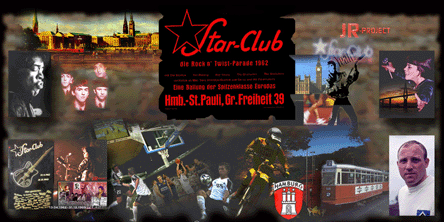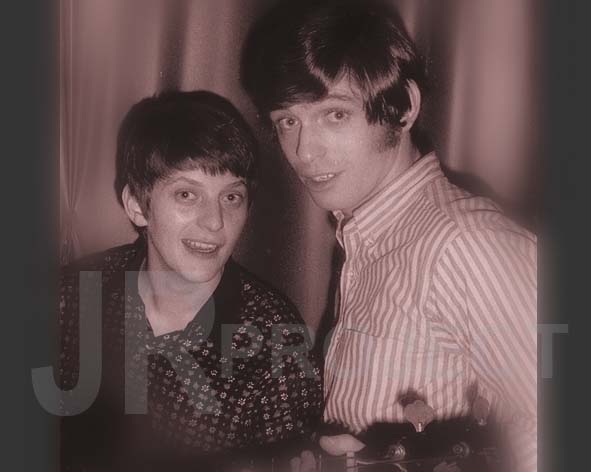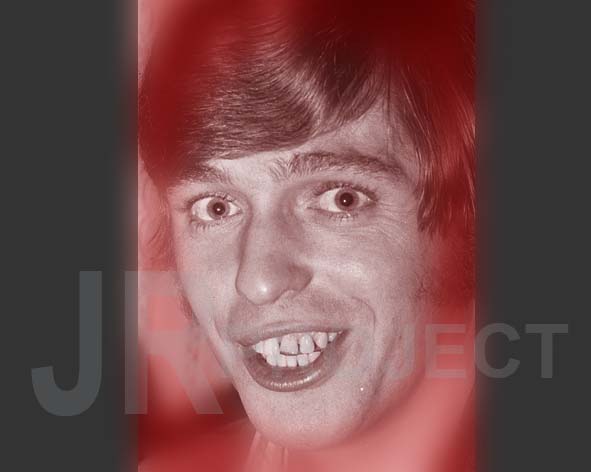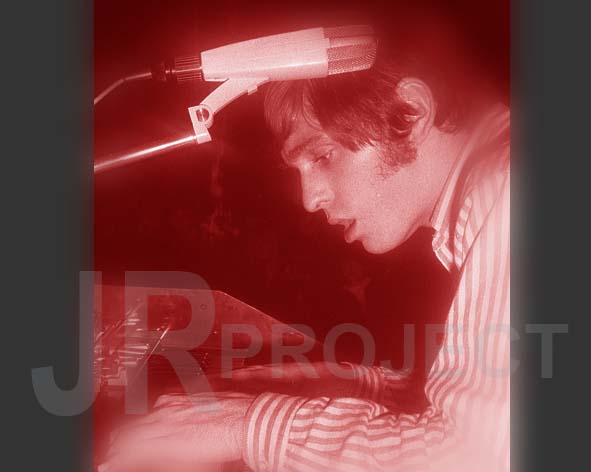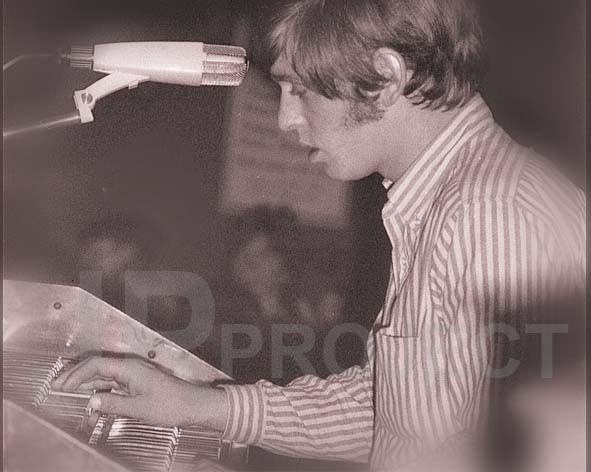|
Born Clive Powell on
June 26, 1943 in the
English industrial
town of Leigh,
Lancashire, Georgie
Fame’s interest in
music initially grew
out of his family
entertaining in the
home and musical
evenings in the
church hall across
the street, where
his father also
played in an amateur
dance band. Although
young Clive began
piano lessons at age
seven, he didn’t
stick too long with
the formal training.
But when rock and
roll started to be
broadcast on the
radio during the
mid-fifties, a
then-teenage Clive
began to take the
piano more seriously.
Fats Domino, Jerry
Lee Lewis and Little
Richard were among
his idols and that
was the basis of his
earliest
“professional”
style. Upon leaving
school, shortly
after his 15th
birthday, he
followed the family
tradition and took a
job as an apprentice
cotton weaver in one
of the many local
mills, but his
leisure time was
spent playing piano
in various pubs and
with a local group,
“The Dominoes.”
In July 1959, at a
summer holiday camp,
Clive was spotted by
Rory Blackwell, the
resident rock and
roll bandleader.
Blackwell offered
the young
singer/pianist a
full time job and
the teenager happily
left his job at the
weaving mill. Rory
and the Blackjacks
departed for London,
their hometown, when
the summer season
ended prematurely
and Clive went with
them. The promise of
lucrative work in
the music business
didn’t materialize,
however, and the
band broke up. The
determined young man
from Leigh opted to
stay on in London,
but for a time it
proved rough going.
He tried
unsuccessfully to
make his way back
home, and eventually
he had the good
fortune of finding
“lodging” at The
Essex Arms pub in
London’s Dockland,
where the kindly
landlord provided
him a room where he
could sleep.
In October of that
year, the Marty
Wilde Show was
performing at the
Lewisham Gaumont and
Rory Blackwell
arranged for Clive
to audition “live”
for impresario Larry
Parnes. After
walking on stage,
without any
rehearsal, he sang
Jerry Lee Lewis’
High School
Confidential and was
promptly hired as a
backing pianist for
the Parnes “stable”
of singers. As with
all the other young
talent Parnes had
taken on (such as
Billy Fury and
Johnny Gentle), he
renamed Clive Powell
“Georgie Fame,” and
the name has stuck
to this day. By the
age of 16, Georgie
had toured Britain
extensively, playing
alongside Marty
Wilde, Billy Fury,
Eddie Cochran, Gene
Vincent, Tony
Sheridan, Freddie
Canon, Jerry Keller,
Dickie Pride, Joe
Brown and many more.
During this time,
Billy Fury selected
four musicians,
including Fame, for
his personal backing
group and the “Blue
Flames” were born.
At the end of 1961,
after a
disagreement, the
band and Fury parted
company.
Another gloomy
out-of-work period
finally ended in
March 1962, when
Georgie Fame and the
Blue Flames took up
what was to be a
three-year residency
as the house band at
the Flamingo Club in
London’s Soho
district. According
to Georgie, they
played “rhythm and
blues all-nighters
to black American
GIs, West Indians,
pimps, prostitutes
and gangsters.” The
band’s reputation as
“the epitome of
cool” spread
rapidly, and in 1963
their first album,
Rhythm and Blues at
the Flamingo, was
recorded live at the
club. A string of
hit records in the
following years
included the No. 1
best sellers, Yeh
Yeh (the first
recording that
knocked The Beatles
off the number one
spot in the charts),
Getaway and 1967’s
The Ballad of Bonnie
and Clyde. Due to
his great
popularity, Georgie
Fame and the Blue
Flames were the only
UK act invited to
perform with the
first Motown Review
when it hit London
in the mid-1960s.
During this time,
Georgie also pursued
his interest in
jazz, recording the
milestone album,
Sound Venture, with
the Harry South Big
Band. This led
directly to
successful tours of
the UK and Europe in
1967 and 1968, which
found Georgie
singing with the
Count Basie
Orchestra.
From 1970 to 1973,
Georgie Fame worked
almost exclusively
in a partnership
with fellow musician
Alan Price (former
keyboard player for
The Animals). The
duo were featured in
their own television
series “The Price of
Fame,” guested on
countless others,
and produced the hit
single Rosetta.
Their partnership
came to a close
several years later,
but the television
exposure had made
Georgie Fame a
household name in
Britain.
In 1974, Georgie
reformed the Blue
Flames and they
continue working
with him (in one
form or another) to
this day. At that
time, Georgie also
began to regularly
step away from the
keyboards to sing
with Europe’s finest
orchestras and big
bands, a musical
tradition he still
currently pursues.
During the
seventies, he also
wrote “jingles” for
several UK radio and
TV commercials and
composed the music
for the feature
films Entertaining
Mr. Sloane and The
Garnett Saga.
In 1981, Georgie
co-produced and
performed with jazz
vocalist, Annie
Ross, on the album
In Hoagland, which
featured the music
of the legendary
Hoagy Carmichael.
After Georgie met
with Hoagy at his
home in Palm
Springs, California,
a film based on the
album was made by
Scottish television.
It went on to win a
gold award at The
New York Television
Festival. A similar
tribute to Benny
Goodman, In
Goodmanland,
recorded in Sweden
with vocalist Sylvia
Vrethammar, followed
in 1983. In 1988,
during one of his
regular visits to
Australia, Georgie
produced the album,
No Worries, with the
Aussie Blue Flames.
And in 1989, the
album, A Portrait of
Chet, dedicated to
jazz trumpeter Chet
Baker, was recorded
in Holland.
Another project,
completed in the
eighties, was a
musical written with
fellow composer,
Steve Gray. This
outstanding piece of
music remains
unperformed in
public with the
exception of a
prototype version
that was broadcast
on Dutch radio with
the Metropole
Orchestra, featuring
Madeline Bell.
It was also in 1989
that Georgie Fame
joined forces with
Van Morrison, after
having been invited
to play Hammond
organ on Van’s
Avalon Sunset album
the previous year.
He continued to
record and tour with
Morrison throughout
the nineties. During
that time, he and
Van co-produced and
performed on the
Verve albums, How
Long Has This Been
Going On, released
in 1995 and Tell Me
Something: The Songs
of Mose Allison,
released in 1996.
In 1990, Georgie
Fame signed with
producer Ben
Sidran’s Go Jazz
Records and his
first album, Cool
Cat Blues, was
released on that
label in 1991.
Recorded in New York
City, it featured
such musical
luminaries as Van
Morrison, Jon
Hendricks, Boz
Scaggs, Will Lee,
Robben Ford, Richard
Tee and Bob Malach.
The follow-up album,
The Blues and Me,
completed in 1991
and released in
1992, was recorded
in similar musical
company. It also
featured special
guests Dr. John,
Phil Woods, Stanley
Turrentine and Grady
Tate. In 1992, the
album, Endangered
Species, was
recorded with the
Danish Radio Big
Band in Copenhagen
and in 1993, the
album, City Life,
featuring Fame,
Madeline Bell and
the BBC Big Band was
released.
A unique album by
Three Line Whip (featuring
Georgie’s sons,
Tristan and James),
Three Line Whip/Will
Carling, was
released in the UK
in May 1994, with
close family friends
and musical
associates of many
years standing
joining the trio in
the studio. They
included Guy Barker,
trumpet; Peter King,
alto sax; Alan
Skidmore, tenor sax;
Steve Gregory, tenor
sax/flute; Anthony
Kerr, vibraphone;
Brian Odgers, bass
guitar and Steve
Gray, digital piano.
Another Three Line
Whip album, Name
Droppin', was
released in 1997,
after being recorded
live in true Blue
Flames style at
Ronnie Scott’s Jazz
Club in London
during one of their
annual residencies.
A second album,
Walking Wounded,
from the same
sessions, was
released the
following year.
Also in 1997,
bassist Bill Wyman
began forming his
new band The Rhythm
Kings and Georgie
Fame became a
founding member.
Since that time,
there have been five
CDs and several
tours, and The
Rhythm Kings "reform"
periodically to tour
and record to the
present day. During
1999, Fame presented
several radio
programs on BBC
Radio, including his
own six-week series
featuring The Blue
Flames plus special
guests, including
Madeline Bell, Bill
Wyman, Zoot Money,
Peter King, Steve
Gray and Claire
Martin. In the year
2000, Georgie’s
critically-acclaimed
CD, Poet in New
York, was voted Best
Jazz Vocal Album by
the Academie du Jazz
in France. In 2001,
the latest Three
Line Whip CD,
Relationships, was
released, which
included some of
Georgie Fame’s
finest songwriting
to date. In the same
year, a compilation
CD, Funny How Time
Slips Away: The Pye
Anthology, was
released.
Throughout his
40-year career,
Georgie Fame has
recorded over 20
albums and 14 hit
singles. He is
equally at home in
the company of jazz
groups and big bands,
orchestras, rock
groups and his own
band, The Blue
Flames. As a sideman,
he has recorded with
many artists,
including Gene
Vincent, Prince
Buster, Muddy
Waters, Eric
Clapton, Joan
Armatrading, Andy
Fairweather-Low,
Bill Wyman and Van
Morrison. Ever on
the road, Georgie
Fame continues to
perform his unique
blend of jazz/rhythm
and blues for live
audiences at clubs
and music festivals
throughout Europe.
Amongst his musical
influences and
heroes, he names
Fats Domino, Ray
Charles, Mose
Allison, Duke
Ellington, Count
Basie, Thelonius
Monk, Betty Carter,
Peggy Lee, Jimmy
Smith, Booker T,
Chet Baker, Johnny
Griffin, Jon
Hendricks, Eddie
Jefferson, King
Pleasure, Lambert,
Hendricks and Ross,
Sonny Rollins,
Richard “Groove”
Holmes and many,
many more.
Georgie Fame - organ/vocals
(born Clive Powell,
September 26th 1943,
Leigh, Lancashire)
John
McLaughlin/Colin
Green - guitar
Mick Eve/Peter Coe -
saxophone
Tony "Tex" Makins/Boots
Slade/Cliff Barton -
bass guitar
Red Reece/Phil
Seaman/Micky Waller/Bill
Eyden/Mitch Mitchell
- drums
Speedy Acquaye -
congas
Johnny
Marshall/Glenn
Hughes - baritone
saxophone
Eddie Thornton -
trumpet
The Blue Flames were
one of the most
popular R&B bands on
the London club
circuit in '63/'64.
Originally, the Blue
Flames were Billy
Fury's backing band
and Fame joined them
in the summer of
1961. At the end of
that year Fury
sacked them and they
decided to see if
they could "make it"
on their own. It
didn't take them
long to establish a
reputation as one of
the best live bands
around.
Of all the groups
playing the London
clubs at this time,
Fame and his band
were the most
jazz-influenced.
The groups' first
three singles made
no impact on the
charts but in late
'64 "Yeh Yeh" went
to the very top. The
first album was
recorded live in
their beloved
Flamingo Club. But
after two more
successful albums
and another No. 1
single, Fame
disbanded the group
in September 1966.
und in deutsch :
Georgie
Fame
(*
26.
Juni
1943
in
Leigh,
Lancashire,
England),
eigentlich
Clive
Powell,
ist
ein
britischer
R&B-Musiker.
Biografie
Bereits
mit
16
Jahren
wurde
Clive
Powell
von
Manager
Larry
Parnes
unter
Vertrag
genommen,
der
bekannt
dafür
war,
dass
er
Musikern
neue
Namen
wie
Marty
Wilde
und
Billy
Fury
gab.
So
wurde
aus
Clive
Powell
Georgie
Fame.
Ab
1960
spielte
Fame
Keyboard
in
der
Band
von
Billy
Fury,
den
Blue
Flames,
die
er
bald
darauf
übernahm
und
mit
denen
er
1964
mit
"Yeh
Yeh"
und
1966
mit
einer
Coverversion
des
Bobby
Hebb-Songs
"Sunny"
die
Spitze
der
englischen
Hitparade
besetzte.
Nach
Auflösung
der
Blue
Flames
1966
begann
Fame
eine
Solokarriere
und
spielte
mit
Mitch
Mitchell
und
John
McLaughlin.
Sein
größter
Solohit
war
The
Ballad
of
Bonnie
&
Clyde,
1968
Nummer 1
in
England.
Außerdem
wirkte
er
in
einem
Gesangstrio
von
Jon
Hendricks
und
Annie
Ross
mit.
1971
bis
1973
bildete
Fame
mit
Alan
Price
das
Duo
Fame
&
Price.
Sie
hatten
einen
Hit
mit
Rosetta.
1974
gab
es
ein
kurzes,
wenig
erfolgreiches
Revival
der
Blue
Flames.
In
den
1970ern
und
1980ern
war
es
relativ
ruhig
um
Georgie
Fame.
Gelegentlich
veröffentlichte
er
Jazzaufnahmen
wie
z.B.
1981
das
Album
„In
Hoagland“,
auf
dem
er
gemeinsam
mit
Hoagy
Carmichael
und
Annie
Ross
zu
hören
war.
Zwischen
1989
und
1997
spielte
Fame
auf
allen
Alben
von
Van
Morrison
die
Keyboards.
Die
Soloalben
in
den
1990er
erhielten
durchweg
gute
Kritiken.
Ab
1998
war
Georgie
Fame
Mitglied
der
Rhythm
Kings
seines
Freundes
Bill
Wyman.
Auf
seinen
Solo-Alben
beschäftigte
er
sich
nun
hauptsächlich
mit
Jazz
und
Blues.
Im
Jahr
2000
veröffentlichte
Georgie
Fame
das
vielgelobte
Jazz-Album
Poet
in
New
York,
das
stilistisch
an
den
von
Eddie
Jefferson
entwickelten
und
von
Jon
Hendricks
vorangetriebenen
Vocalese-Stil
angelehnt
ist.
|

